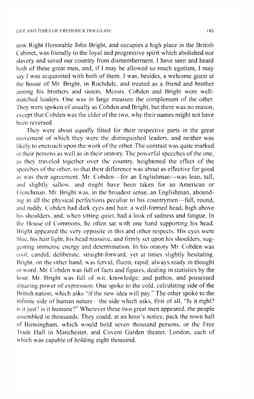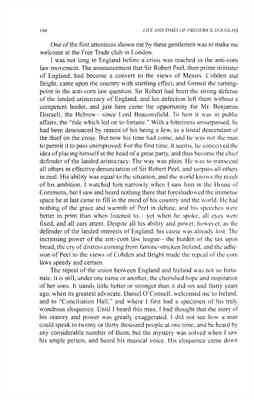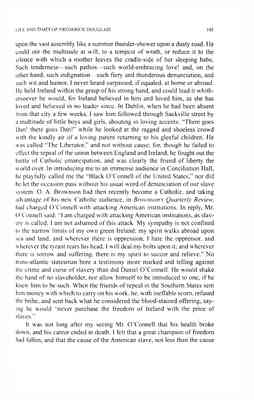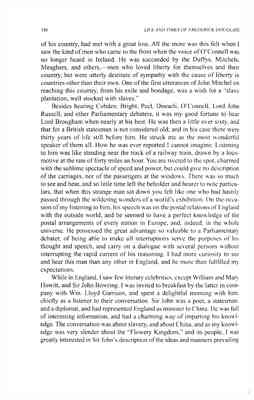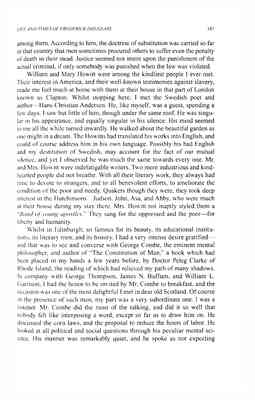Pages
31
LIFE AND TIMES OF FREDERICK DOUGLASS 183
now Right Honorable John Bright, and occupies a high place in the British Cabinet, was friendly to the loyal and progressive spirit which abolished our slavery and saved our country from dismemberment. I have seen and heard both of these great men, and, if I may be allowed so much egotism, I may say I was acquainted with both of them. I was, besides, a welcome guest at the house of Mr. Bright, in Rochdale, and treated as a friend and brother among his brothers and sisters. Messrs. Cobden and Bright were wellmatched leaders. One was in large measure the complement of the other. They were spoken of usually as Cobden and Bright, but there was no reason, except that Cobden was the elder of the two, why their names might not have been reversed.
They were about equally fitted for their respective parts in the great movement of which they were the distinguished leaders, and neither was likely to encroach upon the work of the other. The contrast was quite marked in their persons as well as in their oratory. The powerful speeches of the one, as they traveled together over the country, heightened the effect of the speeches of the other, so that their difference was about as effective for good as was their agreement. Mr. Cobden—for an Englishman—was lean, tall, and slightly sallow, and might have been taken for an American or Frenchman. Mr. Bright was, in the broadest sense, an Englishman, abounding in all the physical perfections peculiar to his countrymen—full, round, and ruddy. Cobden had dark eyes and hair, a well-formed head, high above his shoulders, and, when sitting quiet, had a look of sadness and fatigue. In the House of Commons, he often sat with one hand supporting his head. Bright appeared the very opposite in this and other respects. His eyes were blue, his hair light, his head massive, and firmly set upon his shoulders, suggesting immense energy and determination. In his oratory Mr. Cobden was cool, candid, deliberate, straight-forward, yet at times slightly hesitating. Bright, on the other hand, was fervid, fluent, rapid; always ready in thought or word. Mr. Cobden was full of facts and figures, dealing in statistics by the hour. Mr. Bright was full of wit, knowledge, and pathos, and possessed amazing power of expression. One spoke to the cold, calculating side of the British nation, which asks "if the new idea will pay." The other spoke to the infinite side of human nature—the side which asks, first of all, "Is it right'? is it just? is it humane?" Wherever these two great men appeared, the people assembled in thousands. They could, at an hour's notice, pack the town hall of Birmingham, which would hold seven thousand persons, or the Free Trade Hall in Manchester, and Covent Garden theater, London, each of which was capable of holding eight thousand.
32
184 LIFE AND TIMES OF FREDERICK DOUGLASS
One of the first attentions shown me by these gentlemen was to make me welcome at the Free Trade club in London.
I was not long in England before a crisis was reached in the anti-corn law movement. The announcement that Sir Robert Peel, then prime minister of England, had become a convert to the views of Messrs. Cobden and Bright, came upon the country with startling effect, and formed the turningpoint in the anti-corn law question. Sir Robert had been the strong defense of the landed aristocracy of England, and his defection left them without a competent leader, and just here came the opportunity for Mr. Benjamin Disraeli, the Hebrew—since Lord Beaconsfield. To him it was in public affairs, the " tide which led on to fortune." With a bitterness unsurpassed, he had been denounced by reason of his being a Jew, as a lineal descendant of the thief on the cross. But now his time had come, and he was not the man to permit it to pass unimproved. For the first time, it seems, he conceived the idea of placing himself at the head of a great party, and thus become the chief defender of the landed aristocracy. The way was plain. He was to transcend all others in effective denunciation of Sir Robert Peel. and surpass all others in zeal. His ability was equal to the situation, and the world knows the result of his ambition. I watched him narrowly when I saw him in the House of Commons, but I saw and heard nothing there that foreshadowed the immense space he at last came to fill in the mind of his country and the world. He had nothing of the grace and warmth of Peel in debate, and his speeches were better in print than when listened to,—yet when he spoke, all eyes were fixed, and all ears attent. Despite all his ability and power, however, as the defender of the landed interests of England, his cause was already lost. The increasing power of the anti-corn law league—the burden of the tax upon bread, the cry of distress coming from famine-stricken Ireland, and the adhesion of Peel to the views of Cobden and Bright made the repeal of the corn laws speedy and certain.
The repeal of the union between England and Ireland was not so fortunate. It is still, under one name or another, the cherished hope and inspiration of her sons. It stands little better or stronger than it did six and thirty years ago, when its greatest advocate, Daniel O'Connell, welcomed me to Ireland, and to "Conciliation Hall," and where I first had a specimen of his truly wondrous eloquence. Until I heard this man, I had thought that the story of his oratory and power was greatly exaggerated. I did not see how a man could speak to twenty or thirty thousand people at one time, and be heard by any considerable number of them; but the mystery was solved when I saw his ample person, and heard his musical voice. His eloquence came down
33
LIFE AND TIMES OF FREDERICK DOUGLASS 185
upon the vast assembly like a summer thunder-shower upon a dusty road. He could stir the multitude at will, to a tempest of wrath, or reduce it to the silence with which a mother leaves the cradle-side of her sleeping babe. Such tenderness—such pathos—such world-embracing love! and, on the other hand, such indignation—such fiery and thunderous denunciation, and such wit and humor, I never heard surpassed, if equaled, at home or abroad. He held Ireland within the grasp of his strong hand, and could lead it whithersoever he would, for Ireland believed in him and loved him, as she has loved and believed in no leader since. In Dublin, when he had been absent from that city a few weeks, I saw him followed through Sackville street by a multitude of little boys and girls. shouting in loving accents: "There goes Dan! there goes Dan!" while he looked at the ragged and shoeless crowd with the kindly air of a loving parent returning to his gleeful children. He was called "The Liberator." and not without cause; for, though he failed to dl'cct the repeal of the union between England and Ireland. he fought out the battle of Catholic emancipation. and was clearly the friend of liberty the world over. In introducing me to an immense audience in Conciliation Hall, he playfully called me the "Black O'Connell of the United States;" nor did he let the occasion pass without his usual word of denunciation of our slave system. O. A. Brownson had then recently become a Catholic, and taking advantage of his new Catholic audience, in Brownson's Quarterly Review, had charged O'Connell with attacking American institutions. In reply, Mr. O'Connell said: "I am charged with attacking American institutions, as slavery is called; I am not ashamed of this attack. My sympathy is not confined to the narrow limits of my own green Ireland; my spirit walks abroad upon sea and land, and wherever there is oppression. I hate the oppressor, and wherever the tyrant rears his head, I will deal my bolts upon it; and wherever there is sorrow and suffering, there is my spirit to succor and relieve." No trans-atlantic statesman bore a testimony more marked and telling against the crime and curse of slavery than did Daniel O'Connell. He would shake the hand of no slaveholder, nor allow himself to be introduced to one, if he knew him to be such. When the friends of repeal in the Southern States sent him money with which to carry on his work, he, with ineffable scorn, refused the bribe, and sent back what he considered the blood-stained offering, saying he would "never purchase the freedom of Ireland with the price of slaves."
It was not long afler my seeing Mr. O'Connell that his health broke down, and his career ended in death. I felt that a great champion of freedom had fallen, and that the cause of the American slave, not less than the cause
34
186 LIFE AND TIMES OF FREDERICK DOUGLASS
of his country, had met with a great loss. All the more was this felt when I saw the kind of men who came to the front when the voice of O'Connell was no longer heard in Ireland. He was succeeded by the Duffys, Mitchels, Meaghers, and others,—men who loved liberty for themselves and their country, but were utterly destitute of sympathy with the cause of liberty in countries other than their own. One of the first utterances of John Mitchel on reaching this country, from his exile and bondage, was a wish for a "slave plantation, well stocked with slaves."
Besides hearing Cobden, Bright, Peel, Disraeli, O'Connell. Lord John Russell, and other Parliamentary debaters, it was my good fortune to hear Lord Brougham when nearly at his best. He was then a little over sixty, and that for a British statesman is not considered old; and in his case there were thirty years of life still before him. He struck me as the most wonderful speaker of them all. How he was ever reported I cannot imagine. Listening to him was like standing near the track of a railway train, drawn by a locomotive at the rate of forty miles an hour. You are riveted to the spot, charmed with the sublime spectacle of speed and power, but could give no description of the carriages, nor of the passengers at the windows. There was so much to see and hear, and so little time left the beholder and hearer to note particulars, that when this strange man sat down you felt like one who had hastily passed through the wildering wonders of a world's exhibition. On the occasion of my listening to him, his speech was on the postal relations of England with the outside world, and he seemed to have a perfect knowledge of the postal arrangements of every nation in Europe, and, indeed, in the whole universe. He possessed the great advantage so valuable to a Parliamentary debater, of being able to make all interruptions serve the purposes of his thought and speech, and carry on a dialogue with several persons without interrupting the rapid current of his reasoning. I had more curiosity to see and hear this man than any other in England, and he more than fulfilled my expectations.
While in England, I saw few literary celebrities, except William and Mary Howitt, and Sir John Bowring. I was invited to breakfast by the latter in company with Wm. Lloyd Garrison, and spent a delightful morning with him, chiefly as a listener to their conversation. Sir John was a poet, a statesman, and a diplomat, and had represented England as minister to China. He was full of interesting information, and had a charming way of imparting his knowledge. The conversation was about slavery, and about China, and as my knowledge was very slender about the "Flowery Kingdom," and its people, I was greatly interested in Sir John's description of the ideas and manners prevailing
35
LIFE AND TIMES OF FREDERICK DOUGLASS 187
among them. According to him, the doctrine of substitution was carried so far in that country that men sometimes procured others to suffer even the penalty of death in their stead. Justice seemed not intent upon the punishment of the actual criminal, if only somebody was punished when the law was violated.
William and Mary Howitt were among the kindliest people I ever met. Their interest in America, and their well-known testimonies against slavery, made me feel much at home with them at their house in that part of London known as Clapton. Whilst stopping here, I met the Swedish poet and author—Hans Christian Andersen. He, like myself, was a guest, spending a few days. I saw but little of him, though under the same roof. He was singular in his appearance, and equally singular in his silence. His mind seemed to me all the while turned inwardly. He walked about the beautiful garden as one might in a dream. The Howitts had translated his works into English, and could of course address him in his own language. Possibly his bad English and my destitution of Swedish, may account for the fact of our mutual silence, and yet I observed he was much the same towards every one. Mr. and Mrs. Howitt were indefatigable writers. Two more industrious and kindhearted people did not breathe. With all their literary work, they always had time to devote to strangers, and to all benevolent efforts, to ameliorate the condition of the poor and needy. Quakers though they were, they took deep interest in the Hutchinsons—Judson, John, Asa, and Abby, who were much at their house during my stay there. Mrs. Howitt not inaptly styled them a "Band of young apostles." They sang for the oppressed and the poor—for liberty and humanity.
Whilst in Edinburgh, so famous for its beauty, its educational institutions, its literary men, and its history, I had a very intense desire gratified— and that was to see and converse with George Combe, the eminent mental philosopher, and author of "The Constitution of Man," a book which had been placed in my hands a few years before, by Doctor Peleg Clarke of Rhode Island, the reading of which had relieved my path of many shadows. In company with George Thompson, James N. Buffum, and William L. Garrison, I had the honor to be invited by Mr. Combe to breakfast, and the occasion was one of the most delightful I met in dear old Scotland. Of course in the presence of such men, my part was a very subordinate one. I was a listener. Mr. Combe did the most of the talking, and did it so well that nobody felt like interposing a word, except so far as to draw him on. He discussed the corn laws, and the proposal to reduce the hours of labor. He looked at all political and social questions through his peculiar mental science. His manner was remarkably quiet, and he spoke as not expecting
